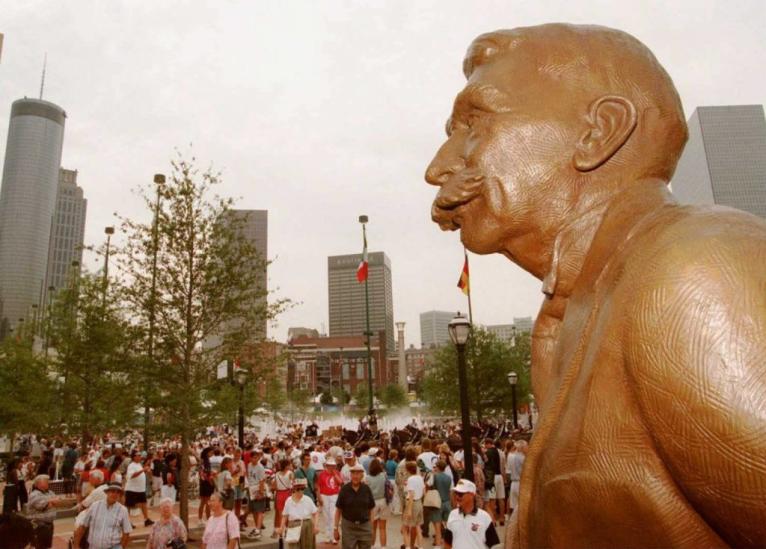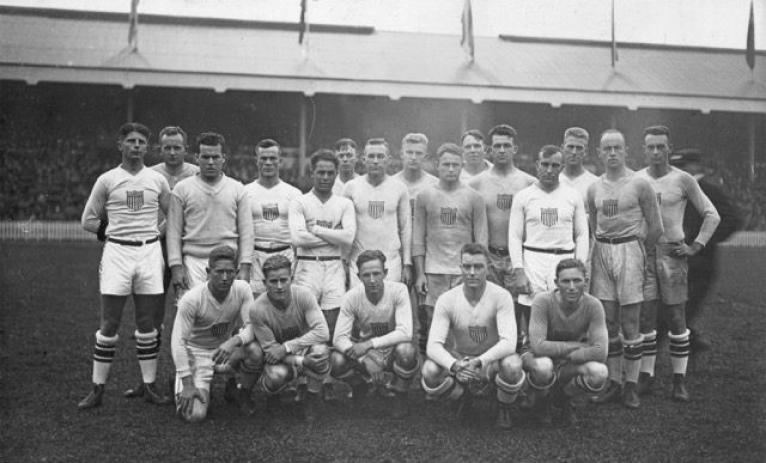Rugby and the Olympics have charted a passionate, ancient and convoluted relationship, ranging from an all-time great clash to fan disruption and a major revolt. The Olympics are the pinnacle of athleticism, serving up a mouth-watering buffet of different sports – rugby sevens, fortunately, now among them.
But rugby’s Olympic journey did not begin with the introduction of its abbreviated format in 2016. Many scintillating rugby stories are woven through the Games’ history. Let us try to inspire the historian inside you, and revisit the names, moments and legends of Olympic rugby.
1892 – A French baron pushes rugby to the fore
Two years before the IOC was founded, France held its first-ever club final, with Stade Français and Racing Club de France (known nowadays as Racing 92) wrestling for the title. The game, played at Bagatelle, was refereed by none other than Pierre de Coubertin, the “father” of the modern-day Olympic Games, and a major driving force in the introduction of sports in the educational system.
A historian, educator and sports aficionado, De Coubertin was heavily involved with the oval ball between the late 90s of the 19th century and the first thirty years of the 20th, helping the game expand and grow.
Yes, rugby didn’t feature in the first-ever Summer Olympic Games, but it was only due to De Coubertin’s efforts the sport would be introduced in the event’s second edition in 1900.
The baron loved rugby, and fought to have it in the Olympics.

“What’s admirable in rugby football is the perpetual combination between individualism and discipline; the fact each man can think ahead, take decisions and, at the same time, listen to his captain’s voice… For all that, rugby football is the true reflection of life, a lesson to be taught to the real world, the best tool to teach.”
After some convincing, and De Coubertin’s election as IOC president, rugby’s on-off Olympic relationship began, delivering some of its weirdest and most telling memories. His retirement from the IOC in 1925 locked rugby out of the Games. It would be nearly 100 years before it returned.
1900 – Moseley Wanderers go for gold
1900 was a ground-breaking year for rugby – and not only because of its Olympic debut. Great Britain and France opted to send combined sides, while Germany chose their main club to travel to Paris. So, the inaugural rugby event was disputed by the Union des Sociétés Françaises de Sports Athlétiques (the ruling body for football and rugby at the time), the Moseley Wanderers (they played one and only one game in their history), and FC 1880 Frankfurt. Weird, right? No, not at the time, as sports were fully amateur endeavours, and national committees had to muddle around to find those most interested in participating in any given sport.
“At the turn of the century, international rugby was still in early days,” explains Victor Ramalho, a Sports Historian PhD. “National teams, regional teams, combines, clubs – the boundaries were fluid. Private backers subsidised tours, while players were amateurs, meaning the very notion of having the undisputed best players of the country together wasn’t a reality.
“The Olympics in 1900 were mixed up with other non-sports events. It was a demonstration of modernity; sports were a big part of the new ways. The concept of a World Cup-like tournament wasn’t born yet. It was much more an exhibition of rugby with international flavour than anything.”
Rugby had also the honour of fielding the first black athlete in the Olympics, with Haitian-born Constantin Henriquez joining the French squad, as he was studying medicine in the Union des Sociétés Françaises de Sports Athlétiques. In between his studies, he was also playing rugby as a loose forward, first for the Olympique de Paris and, starting in 1900, for Stade Français.
The tournament in itself was… bizarre. Three teams should mean two games apiece, but, interestingly, only France played two, while the Germans and British didn’t face each other.
Defunct Parisian newspaper Le Matin (the outlet ceased to exist following 1994 as it supported Naziism during World War II) reported the following quote after the second and last game of the competition, won by the French.
“Yesterday, at the Vincennes Municipal Vélodrome, in the Exhibition annex, was played the second international rugby football match. The national team, so difficult to recover, showed itself admirably in a most energetic fight against adversaries worthy of it. Despite the efforts, sometimes almost violent, of the English, the French achieved the figure of 21 points to nothing. The English then made five points, then three more, summing a total of eight; and the French, in a row, three points, and at the end three more points.

“This match ended, and after a few moments of fighting again, without any new marks, the French team defeated the English by 27 points against 8, a success greeted with loud acclamations. When we left the Vélodrome and the Exhibition annex, everyone did the same as us, sad that the game had ended. To celebrate the end the enclosure was lit up with the thousand lights of the illumination of each Sunday.”
So, by the end of the 1900 Olympics, not only did rugby enter what would become the most emblematic sports event in the world, it was also the first time a black athlete won a medal – and a gold medal at that. For all the sins and problems within the game, the first time the rugby ball was lit up by the Olympic flame, it tried to break some norms. Henriquez would become Haiti’s Olympic committee president, and forever be regarded as a true great.
1908 – The original rugby globetrotter
We are a year away from the British and Irish Lions visiting Australia, in what will be an intriguing affair between two rival sides. But, in the 1900s, there was someone who traversed rugby world, winning a gold medal in the process, and is remembered as a mythical player in Australia, South Africa, the British Isles, and France: Tom Richards.
He was the first rugby globetrotter, going from the Charters Towers Waratahs to the Johannesburg Mines, passing through Bristol and Manly, and even pulled on that iconic shirt of Toulouse. Be it club or provincial rugby, the Australia-born nomad left a deep impact and would be called to represent the Wallabies in the 1908 tour of the British Isles, which would coincide with the Summer Olympics, hosted by England.
The 1908 Olympic Games offered little continuity, as reigning champions France made a last-minute decision to withdraw from competition being unable to field a suitable team. Australia accepted the invitation to replace them with the other contestant being… Cornwall. The British, as in 1900, opted to enroll Cornwall who had secured the County Championship, one of the main regional competitions at the time.
‘I don’t feel the coming danger any more than I have felt anxious the night before an international football match’.
Tom Richards – First Wallaby gold medallist and gallant on the Gallipoli frontline: https://t.co/KOwah9qbZP#AnzacDay2020 #LestWeForget @RugbyAU pic.twitter.com/BoXVHAVeFD
— AUS Olympic Team (@AUSOlympicTeam) April 25, 2020
Cornwall had previously played against the Wallabies, losing 5-18. Richards was one of the main stars of the Australian squad, who also helped his team win the first ten out of eleven games on their UK tour, and was vital in their Olympic triumph.
It would be the only gold medal won by the Australasian delegation, and Richards, who would add a couple more caps for Australia and Great Britain, was part of that unbelievable story of a tour which ended in Olympic glory.
1920 – The American who won three medals
Modern sports and athleticism are a beautiful to watch, but did you know in 1920, an American won three different medals in the Olympics? Morris Kirksey is the name and winning medals was his game! Hailing from Waxahachie, Texas, Kirksey had more than a couple of interests when it came to sports, with athletics and rugby being his favourites.
In 1920, he represented the USA in both events, running the 100m and 4x100m relay and gracing the rugby field. In the timespan of four weeks, Kirksey had to find a way to be fresh and ready to give his best on the track and the pitch, if he wished to stand on the podium.

Well, not only did he win one medal, he took three back to the Lone Star State. He would first progress through a heat, quarter-final, and semi-final, to reach the final of the 100m, joining his fellow countrymen Charley Paddock (still considered one of the best on the track), Jackson Sholz and Loren Murchison. Kirksey would cross the finish line in second posting a time of a 10.9 seconds. A couple of days later, he and his team-mates won the relay, setting a new Olympic record in the process.
With nothing to lose, and having two medals dangling from his neck, Kirksey joined the US rugby team, who had just one game ahead of them to win the gold medal: France. Playing in the Olympic Stadium of Antwerp, with rain, mud, a gritty pitch, and two teams with a different style of play, the match ended up with the star-spangled banner raised in victory.
Kirksey played lock in his first and only rugby game – and one which ended with a golden flavour. He would later be added to the Athletics Hall of Fame at Standford University, and his story remains an extraordinary feat of boundary-breaking.
1924 – Romania’s first Olympic medal
A hundred years ago in Paris, three teams played for the medals with the USA, France and Romania being invited to participate. This would be the last time rugby had the chance to show itself to a larger audience, and it would end with a bang, as the French public lost their patience – but we will get to that.

Romania had never felt the warm touch of the Olympic medals, having only participated in the 1900 edition, when Gheorghe Plagino took part in the trap shooting contest. They only returned in 1924, and what year it was. With most of the northern and southern hemisphere unions taking a pass on the ultimate sports event – the Olympics were not seen as an important tournament for rugby union at the time – Romania was invited alongside the USA and the host nation. The competition was played in a round robin format, and, the Stejarii knew they had already at least won the bronze medal.
The games didn’t go well. The Romanians lost by 58 points to France (61-3) and shipped 37 without reply to the Americans. But, the sacrifices, effort and heart they poured in to going from Bucharest to Paris to win their country’s first ever medal was unforgettable.
Thirty-two years later, squad member Stelian Soare told his story to Romanian newspaper Informatia Bucurestiului.
“We made the four-day trip to the capital of France on the hard seats of a third-class carriage. That’s how I got to Italy, from where I left for Paris on foot, in an emigrant train.”
💬ℹ️ Azi la sediul 🏉🇹🇩 a avut loc conferin?a de pres? care prefa?eaz? noul sezon. La aceasta au participat pre?edintele FRR, Alin Petrache, antrenorul principal, David Gerard, c?pitanul Ovidiu Cojocaru ?i Stejarul Tudor Boldor 👉 https://t.co/tXEj5wykus.#RugbyRomania pic.twitter.com/WAx42m3gIT
— Rugby Romania (@RugbyRomania) February 1, 2024
A hundred years later, Romania still remembers what those players did for their country. To celebrate the centenary of that first-ever medal, the Romanian rugby union printed the names of all 23 of their 1924 Olympians on the back of its shirts.


Comments
Join free and tell us what you really think!
Sign up for free